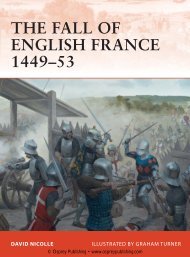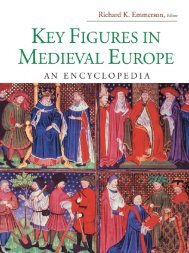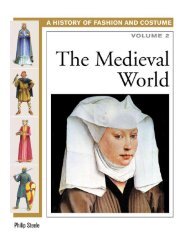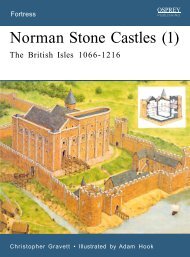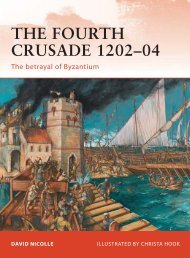Osprey - General Military - Knight - The Warrior and ... - Brego-weard
Osprey - General Military - Knight - The Warrior and ... - Brego-weard
Osprey - General Military - Knight - The Warrior and ... - Brego-weard
You also want an ePaper? Increase the reach of your titles
YUMPU automatically turns print PDFs into web optimized ePapers that Google loves.
0younger son of a minor nobleman who<br />
became a notable tourneyer <strong>and</strong> warrior, a<br />
comrade to princes <strong>and</strong> kings, a powerful<br />
l<strong>and</strong>owner <strong>and</strong>, ultimately, the regent of Engl<strong>and</strong> <strong>and</strong><br />
preserver of the Plantagenet dynasty, William<br />
Marshal's career perhaps best typifies the breadth of<br />
the world of the knight.<br />
Born in 1147, the fourth son of John Marshal, a<br />
mid-rank knight from southern Engl<strong>and</strong>, William was<br />
thrust into the political limelight from a very early<br />
age. John was holding Newbury Castle for Henry I's<br />
daughter Matilda against King Stephen who, in turn,<br />
held the infant William hostage. When Stephen<br />
threatened to hang him unless John surrendered the<br />
castle, the elder Marshal replied that he 'still had the<br />
anvils <strong>and</strong> hammers to produce even finer ones'.<br />
Stephen went to carry out his threat but because of<br />
the child's naive innocence he could not bring<br />
himself to do so.<br />
At around the age of 12 William was despatched<br />
to the continent where he entered the service<br />
of William de Tancarville, the Chamberlain of<br />
Norm<strong>and</strong>y <strong>and</strong> a distant relative of his mother,<br />
where for eight years he served as a squire <strong>and</strong> learnt<br />
his trade. In 1166 he was knighted, at a time when<br />
the conflict between Henry II of Engl<strong>and</strong> <strong>and</strong> Louis<br />
VII of France offered plenty of opportunities for him<br />
to gain experience. William was quick to show his<br />
prowess as an individual warrior, being equally<br />
successful on the tournament field <strong>and</strong> battlefield.<br />
In 1168 William entered the household of<br />
Henry 1 I's son Henry 'the Young King', where he<br />
trained the young prince, who was about five years<br />
his junior, in skill at arms. <strong>The</strong> prince (like Edward<br />
of Woodstock, the Black Prince, son of Edward III,<br />
two centuries later) was at the heart of tournament<br />
<strong>and</strong> chivalric society, <strong>and</strong> William's attendance on<br />
him could only improve his st<strong>and</strong>ing, giving him<br />
access to a rarefied circle of high nobility <strong>and</strong> royal<br />
persons. He remained a part of the Young King's<br />
household, effectively serving as its comm<strong>and</strong>er,<br />
although at one point a rift between them caused<br />
him to strike out on his own, his own prowess driving<br />
him forwards. At the Young King's death in 1183<br />
William was firmly established <strong>and</strong> had a following<br />
of his own.<br />
William undertook a pilgrimage to Jerusalem,<br />
completing the vow originally made by the Young<br />
King before he was taken ill. He returned to enter the<br />
service of Henry II <strong>and</strong>, on the king's death, that of<br />
his son Richard. In 1189 he married Isabel de Clare,<br />
heiress to Richard de Clare, known as 'Strongbow',<br />
Earl of Clare <strong>and</strong> Lord of Striguil, gaining l<strong>and</strong>s in<br />
Wales, Irel<strong>and</strong>, Norm<strong>and</strong>y <strong>and</strong> Engl<strong>and</strong> by the<br />
marriage <strong>and</strong> becoming one of the foremost<br />
magnates of the l<strong>and</strong>.<br />
William was one of the lords to oppose John's<br />
attempt to seize power from his brother whilst<br />
Richard was on crusade, but once the former<br />
became king in 1199 William stood loyally by him<br />
throughout his reign, one of the few barons to do so.<br />
When John died in 1216, he entrusted William with<br />
the task of ensuring that his son, the nine-year-old<br />
Henry III, took the throne, <strong>and</strong> the Marshal was<br />
appointed regent. He defeated the French army<br />
under Prince Louis that had been invited in by rebel<br />
barons to overthrow John, taking the field at the age<br />
of 70. Showing a statesmanship that ensured a rapid



